Piles, also known as haemorrhoids, are swollen veins in the anal canal region. When in their normal state, they act as cushions to control the passage of stools. While the exact cause of piles is unknown, studies1 have shown that factors that increase pressure in the anal area during excretion are hugely responsible for piles.
If you’re experiencing symptoms like a burning sensation in the anal region while sitting or passing stools, it’s important to consult a doctor for proper diagnosis. Follow the treatment advised by your doctor. Along with the prescribed medicines or surgery, you’ll be asked to follow a healthy lifestyle and diet. Initial measures consist of increasing fibre intake, resting and drinking enough fluids to maintain hydration throughout the body. Medicated creams may be applied to the area, but their effectiveness can falter depending on the severity of your situation.
The exact cause behind the occurrence of haemorrhoids is still unknown. While it is difficult to pinpoint what causes piles accurately, there are several factors that may contribute to piles:
Other factors that could equally contribute to the occurrence of piles could be:
Did You Know?
I read about a study4 in Nigeria that highlighted how traditional plants might be beneficial in the treatment of piles. The study found that 25 different plants from 19 families were used, with the most common ones being from the Fabaceae family. Various parts of these plants, such as leaves, barks, roots, etc., may have anti-inflammatory properties to soothe piles naturally. Many of these plants are rare and wild. Hence, more research is needed to protect them, standardise their use and research their effectiveness.
Dr. Nayana Shetty, MBBS, MD

Warm baths can help soothe the irritation that haemorrhoids cause6. Try using a sitz bath. A Sitz bath is a method that uses a small plastic tub that fits over a toilet seat so you can just immerse the affected area. Betadine solution or other antiseptic solutions advised by a doctor can be added to this water.

Apply ice packs or cold compresses to the anal area to relieve swelling for a minimum of 15 minutes at a time. For large, painful haemorrhoids, cold compresses can be an extremely effective means of dealing with the pain7.
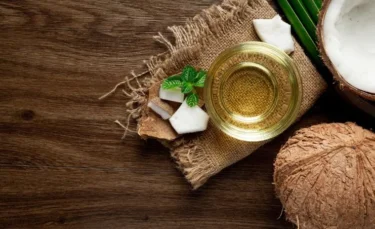
According to research8, coconut oil has strong anti-inflammatory properties that may reduce inflammation and swelling. It has analgesic (pain-relieving) properties that can help to relieve discomfort caused by the haemorrhoids. It also has antibacterial properties that may help with the symptoms of hemorrhoids.
A natural blend consisting of honey, olive oil and beeswax may offer relief for piles. Research9 suggests that this mixture might significantly reduce symptoms like bleeding, itching, and pain, providing a safe and effective treatment option.
Dr. Nayana Shetty, MBBS, MD
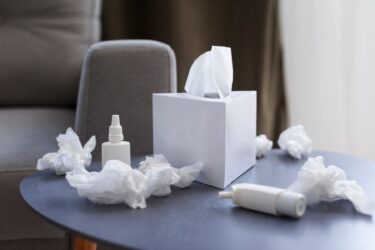
Using toilet paper after a bowel movement can irritate existing haemorrhoids. Moistened wipes help keep you clean without causing further irritation. You can also use wipes with soothing anti-haemorrhoid ingredients, such as witch hazel or aloe vera10.

Exercising at home can be a great way to manage the symptoms of haemorrhoids11. Doing regular pelvic floor exercises may offer long term benefits for piles. Strengthening your pelvic floor muscles can help empty your bowel without putting much strain.
Also Read: Best Home Remedies for Clear Skin

Making a conscious effort to relax and manage stress effectively has an indirect but important effect in regulating good bowel habits. Getting enough sleep at night also helps with the same while maintaining good digestive health. This, in turn, promotes smooth bowel passage12.

This goes without saying, but drinking enough water and other healthy liquids like fruit juices aids in making your bowel less dry13. When your body is well-hydrated, your digestive health starts becoming better, thus helping you put less strain on your bowel movements.

Consuming a balanced diet with ample insoluble as well as soluble fibre will help you with regular bowel movements. Insoluble fibre adds bulk to your stool, making it less likely for you to strain while passing stool14. Fibre is also known to promote a healthy gut.
Drumstick tree or moringa might also be a helpful remedy for piles. Moringa may help reduce inflammation and manage symptoms of piles15. However, since it’s a traditional remedy, more research is needed to fully understand its effectiveness and benefits.
Dr. Nayana Shetty, MBBS, MD
Also Read: Food for Piles: Best Food Options and Foods to Avoid
You should consult a doctor without delay if you notice any of the symptoms mentioned earlier. Some signs of piles can also resemble those of more serious conditions like colorectal cancer. Therefore, an early diagnosis from a doctor is important. Report to your doctor if:
Also Read: Simple Home Remedies for Frequent Urination
Drinking a lot of fluids and a fibre-rich diet, taking a warm bath to soothe itching and pain, applying topical ointments prescribed by a doctor, exercising and keeping the bottom area dry will all act as a catalyst to help you relieve piles faster. It is important to consult a doctor and follow the treatment advised.
Dairy items like milk and cheese, white flour, processed meat, fried food, spicy food items and red meat should be avoided at home and outside if you have started showing symptoms of piles16. Basically, food that increases the chances of bloating and constipation should be avoided.
Your doctor will advise you on the best medicines based on your condition. It may include some medicines to narrow swollen veins, some painkillers and medicines to manage digestive issues like constipation if present.
Yes, haemorrhoids can be both painful and itchy. Piles are swollen and distended veins in the anus and lowest part of the rectum. Haemorrhoids are traditionally associated with prolonged sitting on the toilet combined with straining during bowel movements. It is also common during pregnancy and usually resolves after childbirth.
Disclaimer: The information provided here is for educational/awareness purposes only and is not intended to be a substitute for medical treatment by a healthcare professional and should not be relied upon to diagnose or treat any medical condition. The reader should consult a registered medical practitioner to determine the appropriateness of the information and before consuming any medication. PharmEasy does not provide any guarantee or warranty (express or implied) regarding the accuracy, adequacy, completeness, legality, reliability or usefulness of the information; and disclaims any liability arising thereof.
During summers, temperatures rise and the scorching heat can make us feel completely drained of energy. Ignoring the effects of extreme heat may put our health at risk1.
In the summer, many of us feel dehydrated and lack energy, which are common signs that indicate that we have been affected by heat. That’s why it’s crucial to take extra care of ourselves during the hotter months. By adopting health habits, such as eating well and changing our lifestyle, we can protect our bodies from the summer heat2.
Your body heat can increase because of both internal and external factors. For example, spending too much time out in the sun can cause your body temperature to rise significantly. It can also increase because of heavy exercise or moving around more than usual.
For women, body heat may rise because of conditions like perimenopause and menopause, during which they may experience hot flashes or night sweats. Another significant but uncommon reason why your body heat may rise is due to the use of certain medications3.
Here are the most common causes of increased body heat2,3:
Oranges can reduce body heat! Oranges are believed to be rich in water content that makes them a potential food to reduce body heat. They are also full of fibre, which makes them a great option for those looking to lose weight and still feel full.
Dr. Siddharth Gupta, B.A.M.S, M.D (Ayu)
Normal body temperatures for different demographics3,4:
It is important to understand the symptoms that indicate the body is under stress or discomfort. These may include burning sensation in the eyes, mouth ulcers, indigestion, constipation, sleeplessness, acidity, and some may even experience rapid heart rate.
Let’s understand the top 10 foods to help reduce body heat and enjoy the summer season:

The best drink during summers. Coconut water has cooling properties that can help with the scorching summer months. It has electrolytes which can help keep the body hydrated and regulate body temperature. Coconut water is naturally sweet and is often enhanced by its malai content (tender coconut flesh). You can drink the water and apply the left-out malai on the face, to give a cooling effect on the skin5.

This healthy drink contains essential probiotics, vitamins, and minerals to keep our bodies cool even in extreme heat. Drinking buttermilk daily or maybe twice a day can help to cool down the body5.
Other than buttermilk, a traditional Indian drink, jaljeera is believed to be very helpful to cool down the body. Mint is one of the constituents of jaljeera which is believed to provide the cooling effect.
Dr. Smita Barode, B.A.M.S, M.S.
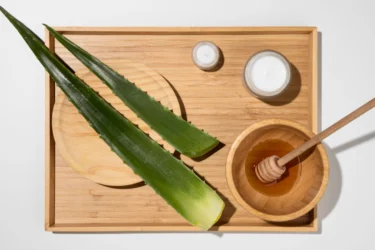
Aloe vera is known as a natural cooling agent as it helps reduce body heat internally and externally. The gel can be applied to the skin to experience the cooling effect. Alternatively, you can mix the aloe vera gel extract with cucumber or mint and blend it to form a smooth mixture – drink it for an internal cooling boost7.
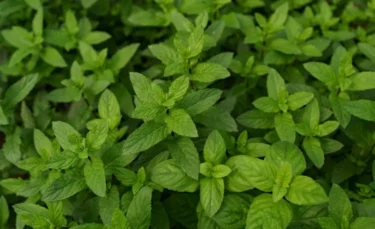
Mint is considered one of the most commonly consumed herbs in India. It is usually added to food or drinks to help neutralise excess body heat and regulate body temperature by providing a cooling effect. Adding mint to curd, buttermilk, or lemon water can add more benefits. You can also make mint chutney, which is one of the most popular chutneys in nearly every Indian households8.
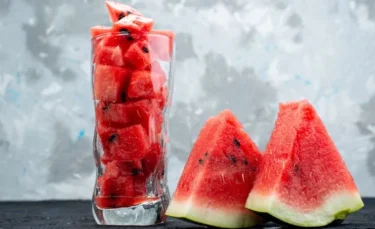
In addition to mangoes, watermelon is another fruit that is often eaten during the summer season in India. Usually, the water content in watermelon is as high as 92%, which will help prevent dehydration and keep the body cool. If consumed regularly, it may help control body heat9.
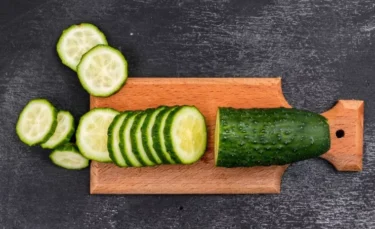
Just like watermelons, cucumbers also have a high amount of water content of 95%. They are also high fibre, which can help relieve constipation, one of the common problems during summers when body heat increases. Cucumber is not only commonly used in salads, but also in facial treatments and to soothe tired eyes. Light, refreshing, and low in calories, cucumbers can be a perfect summer partner9!
Also Read: 8 Health Benefits Of Cucumber That You Should Know

Yes, you read it right! Peppers can help lower your body temperature. According to research10, capsaicin the active ingredient found in chili peppers, produces a cooling effect by sending a message to the brain indicating that the body is overheating and sweating more than usual., Interesting, isn’t it?

Research9 has shown that lemon being rich in Vitamin C can help lower body temperature. It can also moisturise and oxygenate the body, to help improve energy levels and feel fresh during summers. To make lemon juice, squeeze the juice of half a lemon, add a pinch of salt and ½ tsp of sugar (depending on your taste) and mix it with cold water. These ingredients can work as a natural electrolyte for your body.
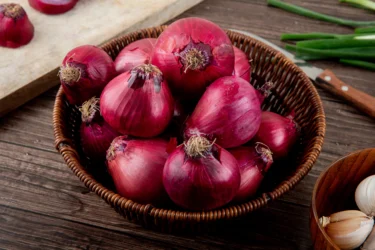
It may come as a surprise, but even onions have a natural cooling effect on the body. Onions are rich in quercetin, which may act as an anti-allergen and also be beneficial to protect against heat-related issues like sunstroke. This is one of the reasons why our grandmothers often made a traditional mix of onion and raw mango during the summer months. You can have onions raw by adding lemon and a little bit of salt or combine them in salads, raitas and sandwiches. Onions are a readily available vegetable with impressive benefits11.
Also Read: 13 Immunity-Boosting Foods To Build A Healthy Life
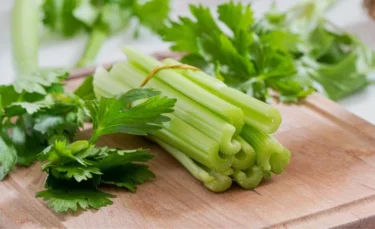
Celery contains 90% water and important nutrients, which can keep you cool in summer. Celery is also high in sodium, potassium, iron, magnesium, calcium, and zinc9.
Malabar spinach, a variety of spinach found majorly in Karnataka, is believed to give a cooling effect to the body. It can be cooked and eaten with chapati. It is also believed to be rich in Vitamin A and C, folic acid and calcium.
Dr. Rajeev Singh, BAMS
Also Read: 8 Health Benefits Of Eating Celery
Yes, body heat can lead to several health problems and may affect overall performance. You will likely experience increased irritability, loss of concentration, and sleeplessness. In serious cases, you may have heat cramps, heat exhaustion, heatstroke, and hyperthermia.
The best and quickest way to reduce body heat is by drinking water. You can also try taking a cold bath and rest.
If your body temperature seems to be high for an undetermined reason or you are not cooling down even after trying to hydrate, consult with a doctor. Additionally, in case you experience excess body heat and are over 65 years of age, or you have an underlying medical condition, or if you are pregnant or nursing, contact a doctor immediately.
Disclaimer: The information provided here is for educational/awareness purposes only and is not intended to be a substitute for medical treatment by a healthcare professional and should not be relied upon to diagnose or treat any medical condition. The reader should consult a registered medical practitioner to determine the appropriateness of the information and before consuming any medication. PharmEasy does not provide any guarantee or warranty (express or implied) regarding the accuracy, adequacy, completeness, legality, reliability or usefulness of the information; and disclaims any liability arising thereof.
Moringa is commonly known as the ‘drumstick tree’ and is found mostly in Asia, Africa, and South America. Moringa tree is also known as the ‘miracle tree’ and there is a reason why. The leaves, fruit, sap, oil, roots, bark, seeds, pod and flowers of the tree have valuable medicinal properties 1,2.
The drumstick leaves, commonly known as moringa leaves, are nutritionally very rich, surpassing carrots, oranges, and even milk in terms of nutritional value. The leaves find many ways to be used in Indian cuisine as they are versatile and can be easily incorporated by adding them to juices or smoothies and using them as stir-fried vegetables are the most common ways in which they are eaten3. When consumed in their natural form, moringa leaves usually have no side effects1. Many South Indian households also use moringa leaves as part of their food preparations2,3.
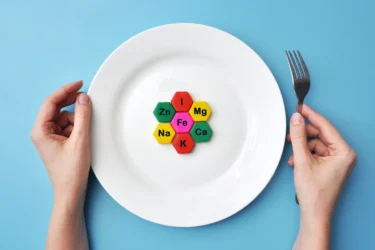
Moringa leaves are rich in vitamins A, C, B1 (thiamin), B2 (riboflavin), B3 (niacin), B6, and folate. They are also rich in magnesium, iron, calcium, phosphorus, and zinc2,5.
One cup of moringa leaves will contain 2 grams of protein, magnesium (8 percent of the RDA), Vitamin B6 (19 percent of the RDA), Iron (11 percent of the RDA), Riboflavin (11 percent of the RDA), and Vitamin A (9 percent of the RDA)2.

Moringa leaves are rich in amino acids, which are the building blocks of proteins. There are around 18 types of amino acids found in moringa and each amino acid makes an important contribution to our wellbeing2.
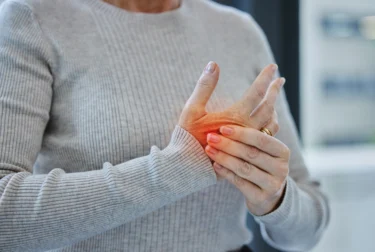
Inflammation is the body’s natural response to pain and injury. Moringa leaves are anti-inflammatory in nature due to the presence of isothiocyanates and the niazimicin in the leaves may provide benefits against the development of cancer cells. Inflammation is the root cause of many diseases like cancer, arthritis, rheumatoid arthritis, and many autoimmune diseases. When we have an injury or infection, increased inflammation can be found in the body.
Although, inflammation is a protective mechanism against trauma, it can increase in the body because of an erratic and poor lifestyle, along with unhealthy diets. Long-term inflammation may lead to chronic health issues and eating moringa leaves may help to reduce inflammation2.

Moringa leaves have anti-oxidative properties and protect against the damaging effects of free radicals present in the environment. The damage caused by free radicals is responsible for many chronic diseases like type 2 diabetes, heart problems, and Alzheimer’s Disease.
Moringa leaves are rich in vitamin C and beta-carotene that may act against free radicals. Moringa also has quercetin which is an antioxidant that helps to lower blood pressure. Another antioxidant that is present in moringa leaves is chlorogenic acid which helps to stabilise blood sugar levels post meals2,3.
Research4 suggests that taking 7g of moringa leaf powder regularly for three months in women may show a significant increase in blood antioxidant levels.
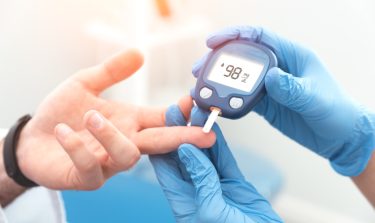
Sustained high blood sugar levels lead to the development of diabetes in individuals. Diabetes, in turn, can cause heart problems and organ damage in the body. Moringa leaves may help stabilise blood sugar levels due to the presence of isothiocyanates and by keeping blood sugar levels in in the normal range, complications may be avoided2.
Based on my medical experience, I want to emphasise the potential Moringa leaves benefits for eye health. These leaves contain high concentrations of vitamin A, which play a vital role in warding off night blindness and maintaining optimal vision. Regular consumption of Moringa oleifera leaves, either as whole leaves or in powdered form, may beneficial in supplementing the essential vitamin A needed to support healthy eyes and potentially delay the onset of conditions like cataract.
Dr. Siddharth Gupta, B.A.M.S, M.D (Ayu)

Apart from oats, flaxseeds, and almonds, moringa leaves may be a dependable herbal supplement against high cholesterol. Cholesterol is the major contributor to heart diseases, and research2 suggests that eating moringa leaves may show considerable improvement to high cholesterol levels, and thereby protect against the risk of heart disease. Pregnant women usually experience higher levels of cholesterol, which can in turn increase the risk of developing gestational diabetes during their term. What is gestational diabetes? It is a type of diabetes that is first detected in pregnant women who did not have diabetes before they were pregnant. Moringa leaves can certainly be included in the diet for gestational diabetes under medical guidance.

Those who have tuberculosis may benefit from moringa leaves as they reduce the negative effects of anti-tubercular drugs. Moringa leaves may accelerate the repair of liver cells as these leaves have a high concentration of polyphenols that may protect against oxidative damage to the liver and may even reduce oxidative stress by activating certain proteins.
The liver is the site of blood detoxification, fat metabolism, and nutrient absorption and can only function properly if the liver enzymes are in normal levels. According to this study2, moringa leaves stabilise these liver enzymes4.

In many parts of the world, arsenic contamination is a common problem. Arsenic has found its way in our systems through many food items, particularly rice.
Long-term exposure to this element can lead to the development of cancer and heart disease. Research7 on laboratory animals have shown that moringa leaves are effective against arsenic toxicity.

Moringa leaves may be beneficial against digestive disorders. Adding moringa leaves to the diet may help individuals who have constipation, bloating, gas, gastritis, and ulcerative colitis.
Studies2 have shown that these leaves may have antibiotic and antimicrobial properties which may suggest to help in digestive disorders. The high amount of B vitamins in the leaves may also help in improving digestion.

Moringa leaves are rich sources of calcium and phosphorus and these elements are needed for bone health. Since moringa leaves are considered to be anti-inflammatory nature, they may help heal damaged bones.
Research8 shows that moringa may help with osteoporosis and also strengthen bones and teeth.
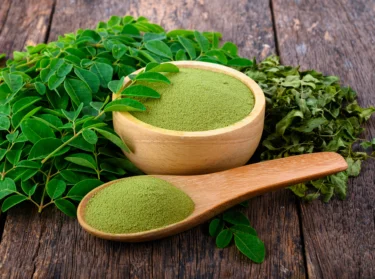
Moringa leaves may have antiseptic properties to fight off bacterial infections. They may also be beneficial towards wound healing, such as in cases of bruises, minor cuts, and burns as they may reduce the clotting time1.

Moringa leaves for pregnancy can be beneficial due to their nutrient-rich composition, potentially supporting the health of both the expectant mother and the developing baby. In traditional Ayurvedic medicine, moringa leaves were used to increase lactation in nursing mothers. Since they are a rich source of protein, important vitamins, and essential nutrients, consuming moringa leaves may be beneficial for the health of the mother and the baby1,2.

Moringa leaves increase fat burning in the body, which helps in maintaining weight loss without depleting energy reserves. Consuming moringa may help reduce cravings and boost metabolism. They may also lower cholesterol by acting as an anti-obesity agent2.

Due to an abundance of antioxidants and nutrients, moringa leaves may improve the health and appearance of skin and hair, providing a supple texture to skin and shine to the hair. The antioxidants present in moringa leaves reduce the appearance of fine lines and wrinkles on the skin. Moringa consists of around 30 antioxidants2.
Moringa can be applied to the scalp to help reduce dandruff and add strength and bounce to dull, lifeless hair. Moringa leaves applied on the skin may be beneficial for acne-prone skin and are part of many cosmetics as they improve the skin tone and add a glow due to their purifying nature and therapeutic properties. However, more research is required to establish these benefits1,3.

Research2 suggests that many nervous disorders show positive results with the supplementation of moringa leaves.2 These leaves can be helpful to support brain health by working as neuro-enhancers. The high concentration of vitamins E and C slow down neural degeneration and help improve brain function. Those who have a migraine or suffer from recurring headaches may benefit from eating moringa leaves regularly. These leaves also work as mood stabilisers as they regulate the production of neurotransmitters like serotonin, dopamine, and noradrenaline which are important for memory, mood, and for stimulus-response3.

Moringa leaves are considered natural cleansers and may help to detoxify the body and increases immunity against various infections. They also increase the energy levels in the body2.
Did you know that fresh Moringa oleifera leaves are not only packed with nutrients but may also provide several health benefits? They contain about 6.7 grams of protein for muscle health, 1.7 grams of fats, 12.5 grams of carbohydrates for energy, and 0.9 grams of fiber for digestion. Adding these nutrient-rich leaves to your diet can be a great way to boost your overall nutrition intake and support a healthy lifestyle.
Dr. Rajeev Singh, BAMS
Also Read: Curry Leaves (Kadi Patta): Uses, Benefits, Side Effects and More!
Over the years, I have observed that moringa leaves are truly remarkable. They contain not only 9 essential amino acids but also 7 non-essential amino acids, making them an exceptional source of protein. This unique combination of amino acids found in moringa leaf powder can have numerous benefits for your overall health and well-being. Adding moringa leaves to your diet can be a great way to ensure you’re getting a wide range of essential nutrients.
Dr. Smita Barode, B.A.M.S, M.S.
Also Read: Simple Home Remedies for Tongue Ulcers
Moringa leaves are a powerful source of nutrition and are anti-inflammatory in nature. Their antioxidative properties combined with their cellular-health protective properties make them a new ‘superfood’. They help suppress the production of inflammatory enzymes and may lower sugar levels. Consider making moringa a regular part of your diet to enjoy moringa leaves benefits with the guidance from a doctor1,2.
Also Read: Betel Leaves: Uses, Benefits, Side Effects By Dr. Smita Barode
Studies have shown that consuming moringa every day may lead to modest reductions in blood sugar and cholesterol levels. Moringa leaves are highly nutritious and consuming them on a regular basis may be highly beneficial for people who are lacking in essential nutrients.
You can take moringa and its products on its own. You may take it with other food, or on its own – it’s entirely up to your preference but a doctor’s advise is recommended.
You may not see positive results instantly after consuming moringa. You may need to take moringa for at least a month or two to see some results. It’s important to share any side effects with your local doctor or a nutritionist to help you manage your intake of moringa.
Moringa tea is an herbal tea made by steeping the moringa leaves in pure hot water. This tea can also be made using moringa leaf powder and tea bags. It is naturally caffeine-free and you can consume it any time of the day.
Moringa is good, showing a variety of health benefits. It is rich in essential vitamins, minerals, and amino acids, which can help boost energy, support immune function, and may provide overall nutrition. Moringa is also known for its potential anti-inflammatory and antioxidant properties.
Moringa may offer numerous potential benefits for women, including improved nutrition, increased energy, and support for bone health due to its rich mineral and vitamin content. It may also help address anemia and offer anti-inflammatory properties, contributing to overall well-being. However, it’s essential for women to consult a doctor before adding moringa to their diet, particularly during pregnancy or while nursing.
Moringa may offer several potential benefits for men, such as improved vitality, enhanced energy, and support for overall well-being due to its rich nutritional profile. It may also aid in addressing specific health concerns, but consulting with a healthcare professional before incorporating moringa into your diet is advisable.
Moringa leaves may be beneficial for weight loss due to their low-calorie, nutrient-rich nature, which can help support appetite and weight management. When added to a balanced diet and exercise routine, this can be a comprehensive approach to sustainable weight loss. However, please consult with your healthcare provider before adding moringa leaves to your diet.
Moringa leaves may offer beneficial properties for the eyes, as moringa is a valuable source of vitamin A. Vitamin A is essential for maintaining optimal eye health and may help prevent night blindness and cataracts.
Disclaimer: The information provided here is for educational/awareness purposes only and is not intended to be a substitute for medical treatment by a healthcare professional and should not be relied upon to diagnose or treat any medical condition. The reader should consult a registered medical practitioner to determine the appropriateness of the information and before consuming any medication. PharmEasy does not provide any guarantee or warranty (express or implied) regarding the accuracy, adequacy, completeness, legality, reliability or usefulness of the information; and disclaims any liability arising thereof.
Alopecia or hair loss is the process in which inactive or dead hair is emitted from the skin. Hair fall may have an impact on the social and psychological well-being of men and women of different age groups1. Hair loss patterns may be apparent, or the hair loss may occur in a diffused pattern2. Hair loss is sometimes permanent, like male pattern baldness and female pattern baldness. These male and female patterns of baldness are usually passed from one generation to another2,3. Although not life-threatening but hair loss is stressful and has a significant effect on the quality of life of the patient. Read along to find some possible home remedies that may be helpful2.
Normally we lose around 50 and 100 hair a day, and we need not worry about it. But sometimes, it may be a sign of an underlying medical condition. The hair loss can be non-cicatricial, known as nonscarring (non-permanent damage of hair follicles), or cicatricial, also known as scarring (possibly permanent and irreversible destruction of hair follicles)2.
Hair loss can be thinning of hair where gradually more scalp becomes visible or hair shedding when large quantities of hair fall out. Determination of the patient’s exact condition may clarify the cause, set of causes, or manner of the hair loss1. The symptoms of hair fall are:
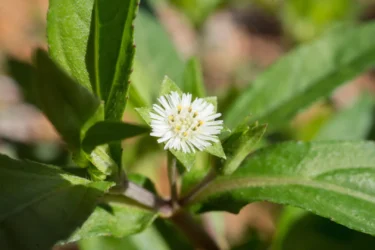
The leaves can be soaked in oil overnight and then boiled. This oil can be applied to hair to prevent hair fall5.

Thefruit powder of amla can be boiled in oil, and this oil can be massaged well on the scalp to prevent hairfall5.

Flower paste of hibiscus mixed with any oil can be applied on hair to prevent hairfall5.

To prevent hair fall, a bottle gourd can be chopped and soaked in oil and then applied to the scalp. A fine cloth may also be wrapped around the head5.

Powder of Brahmi leaves soaked in oil and boiled, then massaged well on the head helps prevent hair fall5.
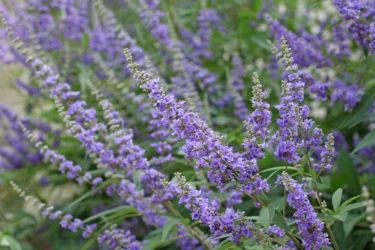
Leaves of the five-leaved chaste tree can be soaked in oil and boiled to prepare an oil mix that can be used as a home remedy for hair fall5.
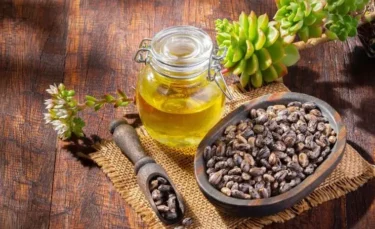
According to a study oil from seeds of arandi was found to show additive effects with olive oil for the management of hair fall. Arandi seed oil massage helps in preventing hair fall5,6.
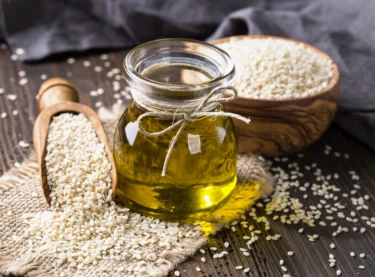
Zinc is found in sesame seeds oil, and it is linked to the healthy growth of hair. Regular application of sesame seed oil also helps prevent hair fall5,7.
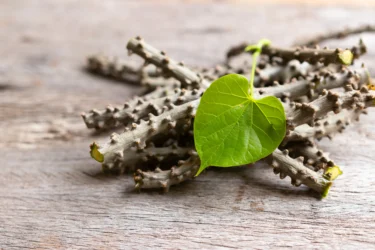
To prevent hair fall, freshly crushed twigs of giloy may be soaked in water. We can drink this water regularly for a month to get the benefits5.
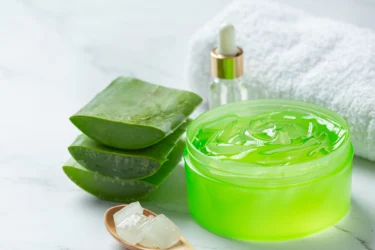
The juice of the leaves of Indian aloe vera can be used for hair washing to improve the growth of hair and control hair fall8.

Extracts of Ginkgo promote hair growth in humans. The extract of ginkgo leaf stimulates the regrowth of hair by a combination of effects such as proliferation (increase in the number of cells) and apoptosis (death of damaged cells) in the hair follicle. Thus, ginkgo can be a possible hair tonic9.
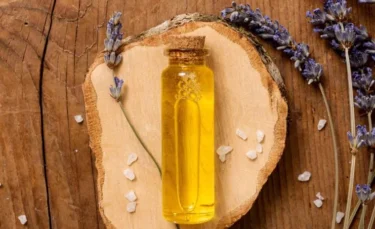
Alopecia areata (an autoimmune disorder that leads to unpredictable and patchy hair loss) can be safely and effectively managed by aromatherapy. Essential oils such as those derived from rosmarinus, lavender, cedarwood and thyme are found to be significantly effective in stimulating hair follicles and can be used as a topical herbal therapy9.
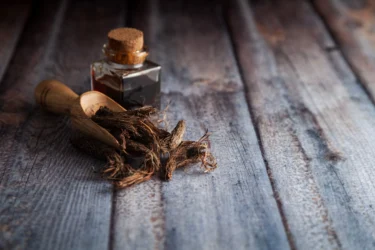
Jatamansi promotes hair growth by enlarging the size of the follicles and increasing the active phase of the hair cycle. Jatamansi shows hair growth effect in alopecia (hair fall) induced by chemotherapy9.
Though there are studies that show the benefits of the given herbs and home remedies in this condition, these are insufficient and there is a need for further studies to establish the true extent of the benefits of these herbs and home remedies on human health. Thus, these should be only taken under the guidance and supervision of your ayurvedic physician.
You must seek a doctor’s advice if:
You must not rely on home remedies for the treatment of this condition you should consult a qualified doctor for any advice for the condition.
Hair loss may not generally need treatment, and we need not worry about it as it is either temporary and the hair will grow back or is a regular feature of growing older3. Hair loss is a rising issue of social concern as it has an impact on a person’s confidence and impacts their quality of life. Home remedies such as gudhal, aloe vera, brahmi, arandi, amla, bhringraj etc, have been used for hair care since ancient times. Hair loss may also be a sign of an underlying medical condition; seek your doctor’s advice if you experience sudden hair loss.
Also Read: Natural Home Remedies for Thick Hair
Female pattern hair loss, which is a common type of hair fall in women, is hereditary. Since female pattern hair loss is more common after menopause, it may be believed that hormones may also play a role in its development10.
It is suggested to take some advice from a dermatologist (skin and hair specialist doctor) as they specialise in detecting and treating hair loss. They can identify if you are suffering from FPHL or if there is some other cause of your hair loss that may be mimicking FPHL. Therefore it is crucial to take expert help to rule out more serious causes10.
Yes, nutritional deficiencies can also cause thinning of your hair. Deficiencies such as lack of sufficient protein, iron, or vitamin B12 in your diet may be responsible for hair loss. You should consult your doctor before taking the supplements4.
Yes, studies have tested the effectiveness of topical crude onion juice in the management of hair loss. It has been observed in the studies that using natural onion juice helps the regrowth of depleting hairlines11.
Disclaimer: The information included on this site is for educational purposes only and is not intended to be a substitute for medical treatment by a healthcare professional. Because of unique individual needs, the reader should consult their physician to determine the appropriateness of the information for the reader’s situation.
The scalp is an area in the body where a significantly tremendous amount of hair glands is present, and a large amount of oily excretion is evident, making it tough to dry out1. This skin on the scalp performs a vital function of protecting the head2. There are numerous hair follicles on the scalp, and the environment is dark, warm, and damp. This provides thermal insulation (prevents heat transmission). However, a dry scalp occurs when the scalp lacks enough oil to keep the skin lubricated1. It also occurs due to conditions like low humidity during winters, using the wrong skin care products, and certain skin conditions1.
A dry, itchy scalp can be distracting, painful, and embarrassing when combined with flaking. In addition, it may be tempting to take matters into your own hands by scratching or attempting to conceal the problem with products, which may aggravate the problem3. Itchiness and flakes caused by the dry scalp can impact one’s quality of life1.
Although skin problems on the scalp are common, there is less awareness about the necessity of skincare in this area1. Continue reading to know more about home remedies for dry scalp.
Did you know?
The dry scalp usually occurs due to a lack of enough oil or excessive oil that results in bacterial growth leading to itching and dryness1,2.
Dry scalp is usually triggered due to the following underlying conditions:
Even though primary clinicians manage the condition, it is best to refer the complex patient to the dermatologist for guidance. Dermatology speciality-trained nurses can also help by counselling the patient, providing direction on medical management, and monitoring and charting treatment progress.
Dr. M.G. Kartheeka, MBBS, MD(Pediatrics)
Dry skin and dandruff can appear similarly on your scalp, making it difficult to distinguish between the two without the expertise of a dermatologist (skin and hair doctor). When you have a dry scalp, you will notice scalp itchiness and flakes of skin from your scalp3.
One of the best remedies for dry scalp is herbal hair oils. They aid in moisturizing the scalp. In addition, herbal hair oils help the sebaceous (oil-producing) glands function normally by supplying essential elements for hair growth. Some home remedies that can be used for dry scalp are1:

This flower is a good source of vitamin A and C. It contains antioxidant, antibacterial, and anti-inflammatory properties. Herbal hair masks made with hibiscus flower paste or hibiscus-infused oil help in conditioning your hair and thus can be used for dry scalp4.
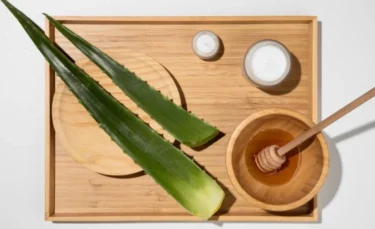
Aloe vera helps in soothing the skin and keeping it moist. This property of aloe vera is beneficial for avoiding the dry and flaky scalp5. It proves to be an excellent skin smoothening moisturiser when mixed with selected essential oils.
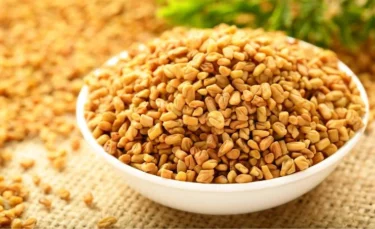
This natural remedy can be used to soothe a dry and itchy scalp. Fenugreek contains nutrients like vitamin C, potassium, iron, protein and lecithin. All these nutrients strengthen hair follicles and maintain hair health4.
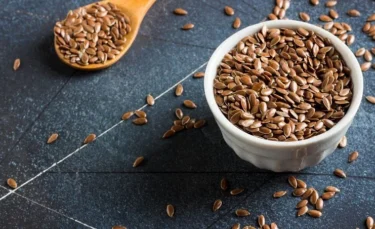
This is also known as common flax or linseed. Flaxseed is filled with antioxidants and fatty acids, which help eliminate toxins and dead cells from the scalp. It can be used as a moisturiser on the scalp and help strengthen hair4.
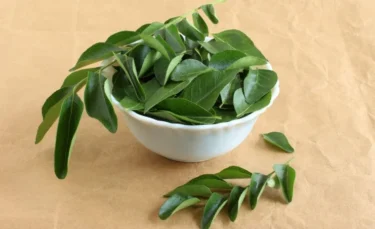
The oil prepared from curry leaves is a known remedy for scalp infections and helps in conditioning the hair. Hence, it is indicated for scalp dryness. It is filled with antioxidants like vitamin C, E, A, and folic acid is an effective remedy for nourishing your hair4.
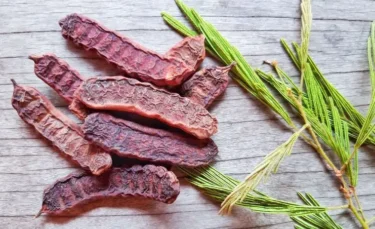
It can be mixed with water to create a paste. This paste can be applied to the scalp as a conditioner. It can be used to clean the hair. Due to its low pH, shikakai does not damage your hair or remove its natural oils while cleansing4.
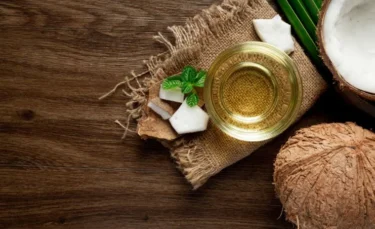
Coconut oil is good for pitta dosh people (they sweat profusely on exposure to heat) because it is a cooling oil. It is high in vitamin K, E, and other minerals. It helps combat scalp dryness and scalp infections and imparts lustre to hair4.

This oil can be used as a moisturiser for the scalp and hair. It helps to manage a dry scalp. Castor is known to enhance blood circulation and improve blood flow. It also has anti-inflammatory and anti-microbial properties4.

The juice obtained from amla or dried amla can be applied to hair as a hair mask. This remedy can fight against dry scalp and strengthen the hair follicles. Its oil also helps reduce scalp infections and irritations4.
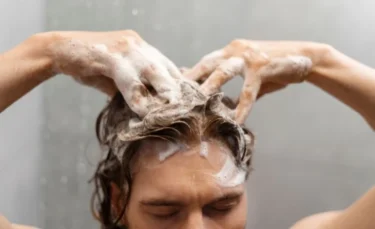
It is necessary to use a proper washing method that will not irritate the scalp. You must spread some shampoo on the palms of both hands, then gently apply it to the back and the top of the head to the front of the head, using the balls of the fingers rather than the nails. Next, you should rinse the roots using fingers to allow warm water to reach the roots. A moisturising lotion can be applied to the dry area of the scalp1.
Usually, a dry scalp can be managed by using a gentle, non-medicated shampoo. However, it is recommended that you visit your dermatologist (skin and hair doctor) if these over-the-counter products do not work.
If you experience other symptoms along with dry scalp or if you need a proper diagnosis and treatment, you should visit a dermatologist3.
A scalp is said to be dry when there is a lack of moisture, due to which you notice itching or flakiness of the scalp3. Dry scalp can be managed by cleaning the scalp with a shampoo and conditioner that produce lesser irritation, using a moisturising lotion, and using a washing method that reduces irritation to the scalp. Those who have dry scalp symptoms must receive timely treatment to diagnose and treat any underlying diseases and take appropriate skin care measures1. There are also several home remedies like the hibiscus flower, aloe vera, amla, shikakai, coconut oil, castor oil, fenugreek seeds, etc., that can be used to manage a dry scalp4.
Also Read: Home Remedies For Hair Thinning
You’ll notice irritation and skin flakes on your head if you have a dry scalp. A dry, itchy scalp can be distracting, uncomfortable, and embarrassing, especially when associated with skin flaking3.
A dry scalp occurs when there is insufficient oil in the scalp to keep the skin lubricated. Psoriasis vulgaris (bacterial infection characterised by red, burning skin with white flakes), pediculosis capitis (head lice), tinea capitis (fungal infection with itchy, scaly and bald patches), and dandruff or seborrheic dermatitis (caused by a fungus) are the primary causes of a dry, itchy scalp2.
Yes, aloe vera is an effective natural remedy for scalp dryness and itchiness4.
Dandruff is caused due to fungal infection, while the dry scalp is caused due to factors like dry air, or some reactions to different hair products3.
Disclaimer: The information provided here is for educational/awareness purposes only and is not intended to be a substitute for medical treatment by a healthcare professional and should not be relied upon to diagnose or treat any medical condition. The reader should consult a registered medical practitioner to determine the appropriateness of the information and before consuming any medication. PharmEasy does not provide any guarantee or warranty (express or implied) regarding the accuracy, adequacy, completeness, legality, reliability or usefulness of the information; and disclaims any liability arising thereof.
Links and product recommendations in the information provided here are advertisements of third-party products available on the website. PharmEasy does not make any representation on the accuracy or suitability of such products/services. Advertisements do not influence the editorial decisions or content. The information in this blog is subject to change without notice. The authors and administrators reserve the right to modify, add, or remove content without notification. It is your responsibility to review this disclaimer regularly for any change
Hairstyle, colour, and length of hair play an essential role in people’s self-perception and physical appearance. Hair greying is one of the initial and most noticeable signs of human ageing. Hair greying, also known as canities, is a process of chronological ageing that affects people regardless of their gender or race. The term premature greying is used when greying occurs before the age of 20 in Caucasians, before 30 in Africans, and before 25 in Asians1.
Premature hair greying (PHG) or canities has a considerable detrimental impact on the affected individual’s appearance and self-esteem, considering the important function of hair in day-to-day social life. It is often thought of as a sign of old age and loss of health.
Did You Know?
Melanocytes are cells within each hair follicle that produce two basic pigments called pheomelanin or eumelanin, according to your DNA. Eumelanin is mostly present in brown and black hair, whereas pheomelanin is found in red and blond hair. The pigments produced in scalp hair degrade more slowly than the melanin that colours the skin. This allows the hair to maintain its colour as it grows for an average of 3.5 years2.
Grey hair develops as the number of melanocytes decreases. But the time when those cells begin to decrease varies from person to person. Here are some causes for hair greying:
Specific genes related to hair greying have been identified. One study3 identified the gene responsible for controlling, producing and storing melanin. It was found that those with PHG had a family history of PHG and had a genetic tendency to develop allergic diseases like asthma or eczema.
Individuals who are overweight or obese are more likely to develop grey hair4.
It was found in a study5 that smokers were at a higher risk of developing premature hair greying than nonsmokers. Although the mechanism behind this could not be found, it was suggested that smoking could increase oxidative stress, which can damage melanin-producing cells.
Stress can speed up the greying process. Stresses that are responsible for a fight-or-flight response might deplete the reserve of stem cells present in hair follicles that can be transformed into pigment cells when new hairs form6.
It was observed in a study7 that a deficiency of vitamin B12 can lead to PHG, which can be reversed when the vitamin is supplemented. Dairy products and meat are common natural sources of vitamin B12. This explains why a vegetarian diet could be a reason for developing PHG. It also might be difficult for older persons to absorb vitamin B12 through digestion.
According to a study1, it was found that diseases like vitiligo and alopecia areata can lead to premature greying. Vitiligo develops when cells that produce melanin stop functioning or die, causing loss of skin colour in patches over the body that commonly grow over time. In a few cases, it also leads to loss of hair colour. In alopecia areata, there can be a sudden loss of colour of hair, which might lead to more noticeable grey hair.
Other conditions that cause hair greying are:
Frequently, patients in their late 30s and 40s express concerns regarding premature greying. In such circumstances, counselling is necessary to educate them that greying is a distinctive aspect of ageing, and we must embrace it. In such instances, available safe colouring options can be considered since reversing natural hair colour may not be feasible.
Dr. Arpit Verma, MBBS MD (Pharmacology)
The average age of onset of premature hair greying ranges from 2 to 22 years, with the earliest age of onset being 2 years.
Certain remedies are known to stimulate pigmentation of hair. These preparations help restore the natural hair colour and may prevent further greying. Some remedies for dealing with grey hair are:
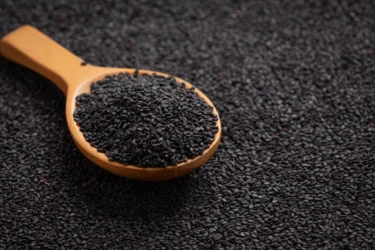
Sesame seeds, especially the black sesame, are known to blacken the hair9. Hence, they can be applied to white hair. Eating some black sesame seeds twice a week may help to slow down or even reverse the hair greying process.
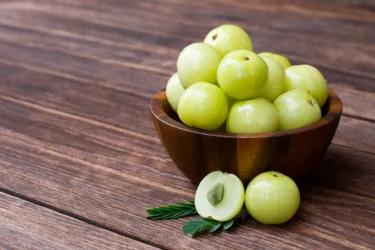
Amla enriches hair pigmentation. Dried fruit of amla and coconut oil can be boiled together till they get charred and used for hair greying. You can massage your hair with this amla oil and drink amla juice regularly to help control the premature greying of your hair.
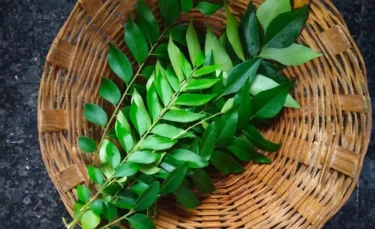
Using curry leaves is considered beneficial in traditional practices for preventing greying. Curry leaves crushed into a paste when mixed with yoghurt can be applied on hair twice a week for potential benefits.
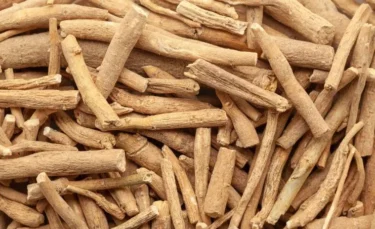
Ashwagandha is traditionally believed to improve blood circulation and help delay premature hair greying. Ashwagandha root powder, along with Brahmi powder, may be formed into a paste and used as a mask. This mask can be massaged on the scalp and washed later for benefits. Consuming ashwagandha tea may also be supportive.

Bhringraj (Eclipta alba) is traditionally known as a “king of herbs” for hair health10. Leaves of Bhringraj may be soaked in any oil overnight, and this oil may be applied to hair.

Hibiscus contains vitamins C and A and iron. Paste of its flower, along with any oil when applied to hair, may help in managing grey hair by blackening the hair.
Asking a dermatologist or trichology expert for assistance is the optimal approach to managing premature greying of hair, as identifying and tackling the root cause is crucial. Home remedies may not be universally successful in treating every case of greying.
Dr. Arpit Verma, MBBS MD (Pharmacology)
Also Read: Effective Home Remedies For Frizzy Hair
Early greying of hair can be treated by obtaining a proper diagnosis and treatment plan.
Also Read: Best Home Remedies for Hair Growth
Premature greying of hair can have a negative impact on young people’s self-esteem, particularly on those with darker hair types, due to the easy sight of grey hair. Therefore, long-lasting and efficient management of grey hair is essential. Today, there are several home remedies like oak galls, barley, onion juice, etc., that are known to be effective in dealing with grey hair.
Even with the proper understanding of the causes of grey hair, the exact reason for its premature onset is not well studied. Hence, satisfactory management for its reversal remains indescribable as of today.
Also Read: Home Remedies To Help Reduce Dandruff Naturally
The pigment called melanin, which gives colour to the skin and eyes, is also responsible for determining the hair’s colour. Hair colour is determined by the quality and combination of melanin.
Grey hair is melanin-depleted hair, whereas white hair is completely devoid of it. This is partly due to a decrease in the number of stem cells that mature into melanin-producing cells. The cells may become worn out, damaged, or lose the support systems that are responsible for keeping them functioning. Genes play a role in melanin production since they help regulate it. There are multiple causes for developing PHG, such as a poor diet, genes, vitamin deficiencies, obesity, smoking, stress and some diseases.
Natural and synthetic hair dyes or colours are available. Indian gooseberry, false daisy, and henna are popular natural colours that are usually safe to use but necessitate frequent touch-ups due to weak colourants. There are two types of synthetic hair dyes- oxidative (use an oxidising agent like hydrogen peroxide to produce hair colour) and non-oxidative (do not contain an oxidising agent)
Deficiencies in vitamins like B12, biotin, folic acid, and vitamin E may contribute to premature hair greying. A doctor can guide appropriate supplementation.
Compounds like calcium pantothenate, green tea extract, phytoestrogens, and para-aminobenzoic acid may be taken orally under a doctor’s guidance to manage grey hair.
Disclaimer: The information provided here is for educational/awareness purposes only and is not intended to be a substitute for medical treatment by a healthcare professional and should not be relied upon to diagnose or treat any medical condition. The reader should consult a registered medical practitioner to determine the appropriateness of the information and before consuming any medication. PharmEasy does not provide any guarantee or warranty (express or implied) regarding the accuracy, adequacy, completeness, legality, reliability or usefulness of the information; and disclaims any liability arising thereof.
We all face issues related to our skin at various points in our life. The colour of the skin plays an important role in a person’s appearance. The skin contains cells called melanocytes. These melanocytes are responsible for producing melanin, a pigment that imparts colour to the skin. When the skin turns darker than normal due to overproduction of melanin, this condition is called hyperpigmentation1. Tanning is the skin’s response to damage caused by harmful rays of the sun. The skin turns darker because of melanin, which is produced by the skin to prevent further skin damage2.
Skin whitening agents may be used when the skin has turned darker than usual and in case of hyperpigmentation. Some skin colour changes can return to normal without any treatment1.
Did you know?
Skin colour is the result of the presence of melanin in the skin. The skin turns darker than normal due to the overproduction of melanin. Melanin overproduction is a consequence of sun exposure and tanning1,3.
When the skin is overexposed to ultraviolet radiation (UVA), it protects itself from sun damage by producing melanin. The formation of more melanin is what makes the skin darker than usual2.
If your skin has turned darker than your usual skin tone, you might be having skin darkening1.
Skin lightening creams should be used under medical supervision without which they may cause more harm than benefit in the form of scarring, excess darkening or excess lightening of the skin, with sometimes visible blood vessels on the surface of the skin. Caution is advised while using skin-lightening creams.
Dr. Ashish Bajaj, M.B.B.S., M.D. in Clinical Pharmacology and Toxicology
Home remedies for skin whitening are as follows:

The ultraviolet (UV) rays are the major component of sunlight that causes hyperpigmentation. Consumption of coffee and tea might be beneficial for reducing skin hyperpigmentation. The polyphenols present in coffee might be responsible for this benefit4. You can make a mask or paste using fresh coffee grounds and apply it directly to your skin. You can use facemasks with tea and apply them directly to the affected area.
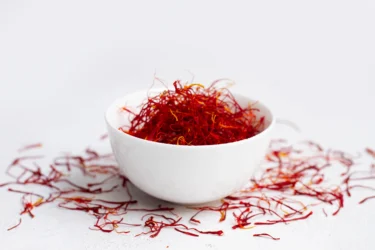
Saffron has skin-whitening and tan-lightening properties. It can be taken with milk to impart a glow and lighten the skin color. It also provides protection from damage due to the sun’s UV rays5. You can put saffron in your homemade facemasks to get benefits.

Grape seeds are rich in antioxidants like vitamin C and Vitamin E. The antioxidant property of grape seeds is helpful in dealing with hyperpigmentation. The antioxidant activity inhibits the enzyme responsible for producing melanin5.
Grape seed extract contains proanthocyanidin, which is a powerful antioxidant. Although, there are no studies on the topical use of grape seed extract, but oral intake for 6 months has been found beneficial in patients with melasma . Also grape seed extracts has many beneficial health effects apart from skin lightening.
Dr. M.G. Kartheeka, MBBS, MD(Pediatrics)
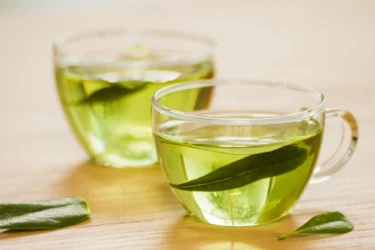
The presence of certain chemical constituents in green tea provides protective benefits to the skin against harmful UV radiation present in sun rays5. You can put green tea in your face pack and apply it to the affected area.

It is used as a skin-lightening agent that can manage hyperpigmentation. It is also used as an ingredient in many herbal cosmetics because of its anti-aging and antioxidant benefits5. Its seed oil can be used on the skin to get the benefits.
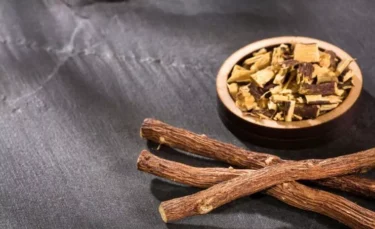
Liquorice root contains glabridin, which is referred to as whitening gold because of its skin whitening properties. Glabridin is a common ingredient of many cosmetics meant for skin whitening. Liquorice exerts a skin whitening effect by stopping an enzyme essential for melanin formation6. You can use liquorice root to make powder. This powder can be applied directly to the skin to get the benefits. You can also include this powder in your facemask recipes.

It may help prevent hyperpigmentation of the skin. You can follow these steps to avoid sun damage:
Though there are studies that show the benefits of the given herbs and home remedies in this condition, these are insufficient and there is a need for further studies to establish the true extent of the benefits of these herbs and home remedies on human health. Thus, these should be only taken under the guidance and supervision of your Ayurvedic physician.
Also Read: Vitamin E Capsule for Face: A Research-Backed Guide for Better Skin Health
You should consult a dermatologist if you notice:
You must not rely on home remedies for the treatment of this condition you should consult a qualified doctor for any advice for the condition.
Also Read: How to Get Rid of Skin Tags: A Step-by-Step Guide Based on Science
Skin darkening and hyperpigmentation can have many underlying causes that stimulate the overproduction of melanin in the skin. There are home remedies that might be useful in lightening the tan and giving skin whitening effects. These are commonly found ingredients, like tea, coffee, and saffron4,5. Skin whitening is a personal choice, and it should not depend on somebody else’s opinion. But if you experience a severe form of hyperpigmentation or unexplained skin darkening, you need to contact a dermatologist1,7.
Also Read: Natural Home Remedies for Hyperpigmentation
Coffee is a good home remedy for skin lightening, as it is helpful in reducing hyperpigmentation. Herbal remedies like saffron, grape seeds, liquorice, green tea, and Beefsteak plant might also be beneficial in skin whitening and preventing skin damage4,6.
Overexposure to UV radiation present in the sunlight causes the skin to produce melanin. This melanin turns the skin darker to prevent further damage to the skin2.
Hyperpigmentation can have many causes: pregnancy, use of certain drugs, build-up of iron in the body (haemochromatosis), skin inflammation, Addison’s disease, and birthmarks1.
If you experience sudden or unexplained skin darkening, you should seek immediate medical help1.
Though not normal, hyperpigmentation is a common condition. It may make people self-conscious, but specific lifestyle changes and treatments may be helpful in managing hyperpigmentation7.
You can start by protecting your skin from the sun; it may help prevent hyperpigmentation. You can follow these steps to avoid sun damage: Applying sunscreen every day; Using a broad-spectrum sunscreen that blocks both UVA and UVB and has an SPF of 30 or higher. You can also wear protective clothing or hats before going out in the sun. If you use sunblock, use a physical blocker like titanium oxide or zinc oxide7.
The patches of dark brown or light brown skin that appear during pregnancy are called melasma. It appears because of the overproduction of cells that make melanin. Melasma is a relatively common, harmless, and normal occurrence that might fade on its own after a few months. You can seek medical help from a dermatologist as well8.
Disclaimer: The information provided here is for educational/awareness purposes only and is not intended to be a substitute for medical treatment by a healthcare professional and should not be relied upon to diagnose or treat any medical condition. The reader should consult a registered medical practitioner to determine the appropriateness of the information before consuming any medication. PharmEasy does not provide any guarantee or warranty (express or implied) regarding the accuracy, adequacy, completeness, legality, reliability, or usefulness of the information; and disclaims any liability arising thereof.
Links and product recommendations in the information provided here are advertisements of third-party products available on the website. PharmEasy does not make any representation on the accuracy or suitability of such products/services. Advertisements do not influence the editorial decisions or content. The information in this blog is subject to change without notice. The authors and administrators reserve the right to modify, add, or remove content without notification. It is your responsibility to review this disclaimer regularly for any changes.
A variety of human skin colours are evident across the globe, ranging from the very pale to very dark skin complexion. There are several conditions related to skin pigmentation over this spectrum of skin tones, resulting in problems ranging from hypopigmentation (patches of skin that are lighter than your actual skin tone) to hyperpigmentation (patches of skin that are darker in colour than the surrounding skin)1.
Skin hyperpigmentation occurs when melanin, a pigment that is responsible for imparting colour to the skin, is overproduced in certain areas of the skin. It is important to have a complete understanding of the causes of this condition and the management strategies3.
Hyperpigmentation can be caused by several factors like:
These have an external cause or origin and include:
These have an internal source or origin and include:
Deficiencies of certain vitamins like folic acid, vitamin B12, niacin, vitamin A, tryptophan deficiency, and kwashiorkor (a type of malnutrition due to protein deficiency in the diet) may contribute to hyperpigmentation3.
Studies4 conducted on animals have shown that the use of aloe vera leaf extract, specifically its active compound ‘aloin’, can lead to skin lightening by restricting melanin formation. As a result, aloe vera gel may be employed to alleviate skin hyperpigmentation.
Dr. Siddharth Gupta, B.A.M.S, M.D (Ayu)
Different types of hyperpigmentation and their symptoms include:
Home remedies for hyperpigmentation may help improve the appearance of dark skin patches. Some remedies include:
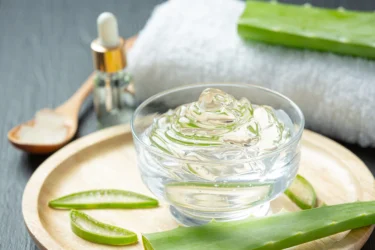
The gel of this plant is used to manage many skin conditions. It may be useful to reduce hyperpigmentation of the skin. Aloesin is the active ingredient of aloe vera and can potentially control an excess of melanin production and skin hyperpigmentation6. To obtain beneficial effects, you can apply aloe vera gel directly to the affected area. You can also put aloe vera gel in your homemade face masks.

It is known for its antioxidant and anti-inflammatory activities. Green tea has potential skin-lightening effects and may help lighten hyperpigmentation. In one study6, green tea was also found to be effective in preventing skin redness caused by ultraviolet (UV) radiation. To use green tea for skin, you can make a green tea face mask or put green tea in your homemade mask recipes.
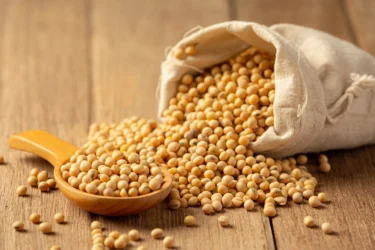
This remedy is an effective skin-lightening agent. Soybean is helpful in post-inflammatory hyperpigmentation due to acne. It is also effective in photodamage (changes in the appearance of skin due to UV radiation), facial hypermelanosis (altered facial skin pigmentation), and melasma6. You can add soy to your diet to get the much-needed benefits. Sipping on soy milk is a good option.
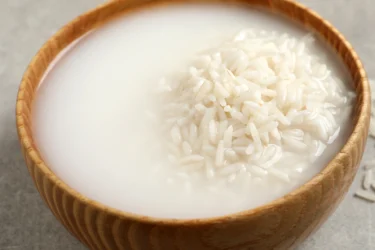
This is one of the essential ingredients in several Asian skin and hair treatments. The gel and cream formulations of rice water exhibit skin lightening effect. Rice water may be a helpful remedy for dealing with hyperpigmentation6. There are several ways through which you can make use of rice water.
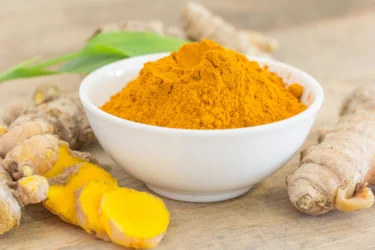
This home remedy may also be beneficial in managing hyperpigmentation7. To use turmeric for skin, you can make a turmeric face mask. To make the facemask, you can mix small amounts of turmeric, honey, and Greek yoghurt and apply it to your face. You can keep the mask for 15 minutes and then wash it off with water.

Rich in antioxidants, pomegranate may help reduce pigmentation2. To use pomegranate, you can crush a few seeds and use it as an exfoliating mask. Make sure to massage gently as it might irritate the skin. You can also use pomegranate skin oil. You should apply the oil only after cleansing and toning but before moisturising.

The oil obtained from grape seeds is rich in vitamin E and C, potent antioxidants. The antioxidant benefits are useful for dealing with hyperpigmentation8. To use grape seed oil, you can:
Research4 has demonstrated that soy contains fatty acids and isoflavones that hinder melanin production (a pigment responsible for skin colour). Soy-based skincare products are proven safe and effective in reducing hyperpigmentation, with noticeable skin lightening results typically seen after 12 weeks of twice-daily use. Prolonged daily use over 7 months does not lead to adverse effects and the depigmentation effects are reversible. You may therefore use soy-based products to reduce hyperpigmentation.
Dr. Rajeev Singh, BAMS
Also Read: Home Remedies to Keep Dark Circles Away!
You should consult your dermatologist (skin and hair specialist doctor) when you notice symptoms like:
Also Read: Natural Home Remedies for Blood Clots
At times, extra melanin is produced by the skin, resulting in dark spots or patches that contrast with the surrounding skin. Hyperpigmentation is a common skin condition that can, however, make one self-conscious. The causes of hyperpigmentation can be external and internal. Some of the home remedies that can be used to manage hyperpigmentation include aloe vera gel, green tea, soy, rice water, turmeric and pomegranate. However, you must visit a doctor if you notice red, itchy, or painful skin, skin that feels hot on touching, or bleeding or pus discharge from the hyperpigmented skin.
Also Read: Simple Home Remedies For Skin Allergies and Rashes
Hyperpigmentation is a common condition that results in some areas of the skin being darker than other areas. The word ‘hyper’ means more, and ‘pigment’ means colour.
Other treatment options for hyperpigmentation include pigmented lesion laser, cryotherapy, chemical peels, and laser skin resurfacing.
The various types of hyperpigmentation disorders include post-inflammatory hyperpigmentation, melasma, solar lentigines, ephelides (commonly known as freckles), café-au-lait macules (flat, pigmented spots on the skin), etc.
Pigmentation disorders are diagnosed by a doctor by obtaining a proper medical history, physical examination, skin examination, biopsy, and blood tests to check hormones, vitamins, iron, and thyroid function.
Disclaimer: The information provided here is for educational/awareness purposes only and is not intended to be a substitute for medical treatment by a healthcare professional and should not be relied upon to diagnose or treat any medical condition. The reader should consult a registered medical practitioner to determine the appropriateness of the information and before consuming any medication. PharmEasy does not provide any guarantee or warranty (express or implied) regarding the accuracy, adequacy, completeness, legality, reliability or usefulness of the information; and disclaims any liability arising thereof.
Indigestion (dyspepsia) is slight discomfort in the upper abdomen or belly. It frequently happens during or immediately after eating1. Indigestion, sometimes known as a sour stomach, can occur occasionally or frequently. It may produce pain or a burning sensation in the abdomen2.
The efficiency of your digestion is determined by the power of your digestive fire (Agni). Suppose your food intake is large and heavy, very liquid, or quite dense in quality. This is opposite to digestive fire properties and can inhibit the normal function of the digestive fire, resulting in indigestion3.
Did you know?
The most common causes of indigestion include
Other causes of indigestion are
Functional dyspepsia is relapsing and remitting. Population studies have shown that 15% to 20% of patients have persistent symptoms during extended follow-up, while 50% have complete resolution of symptoms. Dietary hygiene remains the best treatment.
Dr. M.G. Kartheeka, MBBS, MD(Pediatrics)
Symptoms of indigestion may include:
Changing eating habits, such as giving adequate time for meals, avoiding disputes during meals, avoiding exercise immediately after a meal, chewing food properly and completely, relaxing, and getting enough rest if indigestion is caused by stress, can help to reduce indigestion. You may require medications to manage indigestion based on your condition1.
You can follow these home remedies that will help to cure indigestion in a safe and natural way.
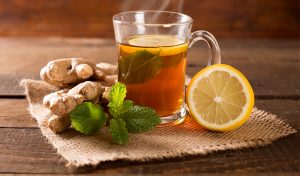
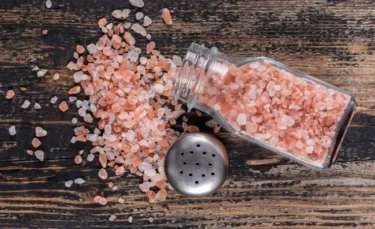
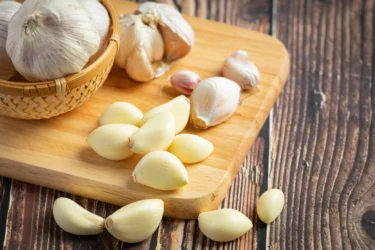
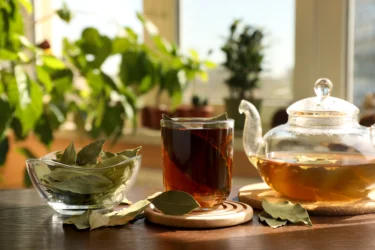
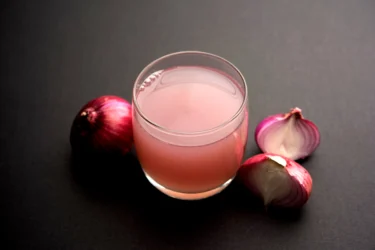
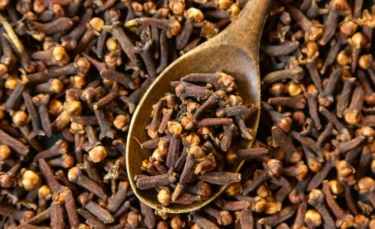

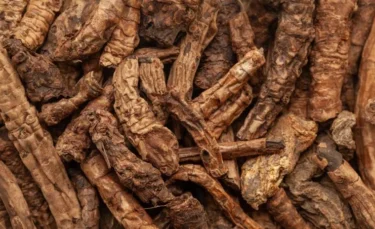
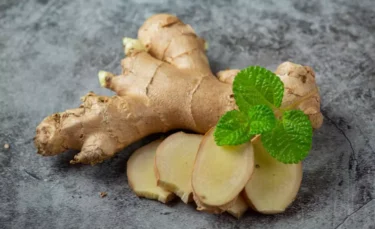
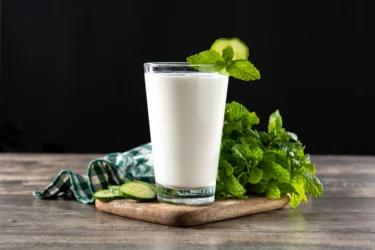
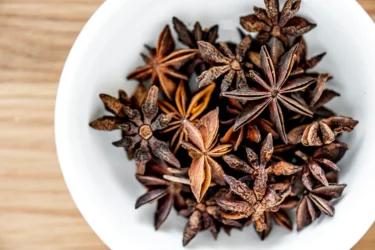
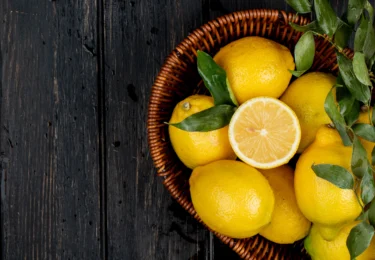
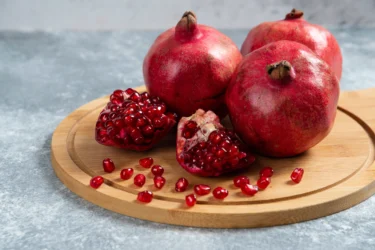

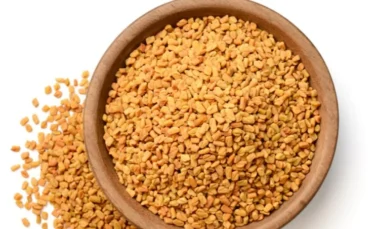
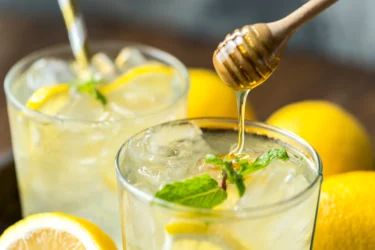
Those who suffer from indigestion should adhere to specified food guidelines. These include not eating and drinking simultaneously, never rushing through a meal, never eating on an empty stomach, never sitting down to a meal when anxious, tired, excited, or in a bad mood, and not eating if your appetite is lacking4.
Also Read: Natural Home Remedies for Loose Motion
It is common to have stomach pain now and then. However, frequent stomach issues can prevent you from eating, sleeping, or working well. If indigestion is impacting your quality of life, it’s time to contact a doctor. Several professionals can assist you. Consult a doctor and a dietician for the treatment. You should consult a doctor if you experience any of the following symptoms2.
A doctor will review your medical history, symptoms, and lifestyle. They will conduct a physical examination to examine your abdomen for swelling or pain with a stethoscope2.
Also Read: 5 Instant Home Remedies For Gastric Problem
Indigestion (dyspepsia) refers to a slight stomach discomfort that occurs in the upper abdomen or belly. It often occurs at the time of eating or immediately after eating. It may cause abdominal pain or a burning sensation2. It may be caused due to eating too much or too fast, eating spicy or acidic foods, high-fibre foods, drinking too many caffeinated beverages, alcohol, experiencing stress or anxiety, taking certain medications such as aspirin on an empty stomach, smoking or chewing tobacco1,2. Simple home remedies that may help with indigestion include consuming mint juice with honey, drinking bay leaf tea with a pinch of cardamom, taking thin buttermilk mixed with pepper powder and cumin powder, etc3. If you have frequent or bloody vomiting, chest pain, black stools, difficulty in breathing, jaundice, unexplained weight loss, and severe belly pain, you should see a doctor for proper treatment2.
Also Read: Simple Home Remedies For Bloating
Indigestion is slight discomfort in the upper abdomen or belly that frequently happens during or immediately after eating1.
Yes, simple home remedies that may help with indigestion include consuming onion juice with honey, drinking bay leaf tea, chewing grated ginger with lime juice and salt, etc3.
Eating too much or too fast, high-fibre food, spicy or acidic foods, drinking too many caffeinated beverages, alcohol, experiencing stress or anxiety, taking certain medications such as aspirin on an empty stomach and smoking or chewing tobacco are the common causes of indigestion1.
Abdominal bloating, gas, burping, acidic taste in the mouth, nausea, vomiting, burning pain in the stomach or upper abdomen and gurgling sound in the stomach are the symptoms of indigestion2.
When you modify your diet and habits, you may notice a significant reduction in indigestion. If you must take medication for indigestion, do so only with your doctor’s permission. Long-term side effects are possible with several drugs. These could include a higher risk of infections or a deficiency in essential nutrients2.
Disclaimer: The information provided here is for educational/awareness purposes only and is not intended to be a substitute for medical treatment by a healthcare professional and should not be relied upon to diagnose or treat any medical condition. The reader should consult a registered medical practitioner to determine the appropriateness of the information and before consuming any medication. PharmEasy does not provide any guarantee or warranty (express or implied) regarding the accuracy, adequacy, completeness, legality, reliability or usefulness of the information; and disclaims any liability arising thereof.
Links and product recommendations in the information provided here are advertisements of third-party products available on the website. PharmEasy does not make any representation on the accuracy or suitability of such products/services. Advertisements do not influence the editorial decisions or content. The information in this blog is subject to change without notice. The authors and administrators reserve the right to modify, add, or remove content without notification. It is your responsibility to review this disclaimer regularly for any changes.
We all care about hair thinning and hair loss at some point in our lives. Hair is an important feature of our appearance. The human body has hair spread across the entire skin surface, except for the palm of hands, sole of feet and lips. Hair performs functions like protecting sensitive areas such as the nose and eyes from dust and communicating the sensation of light touch. The colour, thickness, curl, and amount of hair depend on genetic factors. Hair is composed of a protein called keratin. The process of hair growth and maturity is called keratinization1. Once the lifecycle of hair is over, it falls off and is replaced by new hair2.
Your body loses more and more hair as you age. It is a common problem faced by nearly everyone. But it is important to not take any medications without seeking professional help. You may experience hair thinning because of loss of hair strands on the head or with ageing2,3.
You may experience hair thinning because of the causes listed below:
Also, do inform your doctor of past allergies to medication, if any.
Underlying and undiagnosed cancer, thyroid problems, hormonal imbalance, and regular medications can cause rapid hair loss over months or even weeks in some patients.
Dr Ashish Bajaj, M.B.B.S M.D. in Clinical Pharmacology and Toxicology
Hair thinning can be a sign of hair loss. Hair loss has significant social and psychological consequences for both men and women3.
Common symptoms of hair thinning include:
Home remedies to promote hair growth and hair health are as follows:
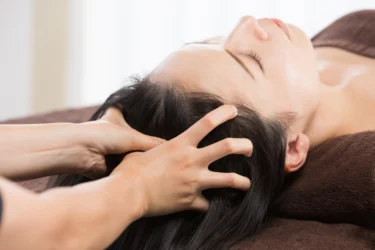
Scalp massage is helpful in increasing hair thickness. The mechanical stimulation of cells and improvement in the blood flow increases the thickness of hair5.
Delve into meditation and yoga to improve your mental health and reduce your anxiety as yoga and meditation are considered to as effective remedies to promote hair growth and reduce stress-related hair loss.
Dr Ashish Bajaj, M.B.B.S, M.D. in Clinical Pharmacology and Toxicology

You can use dry fruit powder of amla for shampooing hair. It can also be used as a hair tonic. Amla is strongly suggested for hair care6.

You can use dry powder or pods of shikakai to promote hair growth and prevent hair-splitting. It is used for the healthy growth of hair and to keep hair in its original colour6.
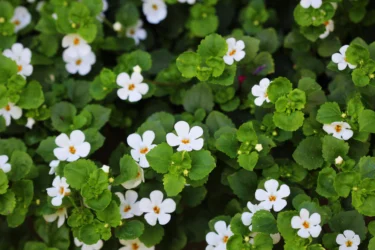
You can use hair oil containing Bramhi to promote hair growth. Certain alkaloids present in Bramhi may be responsible for hair growth benefit7.

Fenugreek or methi is a commonly used aromatic herb. The leaves are beneficial in preventing hair fall. Fenugreek is also helpful in promoting hair growth7.

The leaves and flowers of China rose are used to promote hair growth. China rose is also helpful in increasing hair length. It acts by increasing the follicular size and prolonging the anagen phase (active phase) of the hair7.
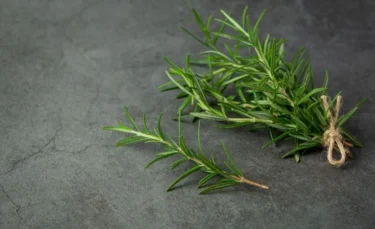
Rosemary stimulates hair growth. The topical application of rosemary stimulates hair follicles. In addition, aromatherapy with rosemary oil is beneficial in promoting hair growth7.
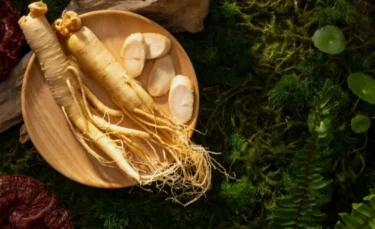
Ginseng has hair growth-promoting activity. Red ginseng is more beneficial than white ginseng in promoting hair growth. It acts by inhibiting the enzyme responsible for hair loss in men7.

Jatamansi has hair growth-promoting activity. It acts by increasing the follicular size and prolonging the active phase of hair7.
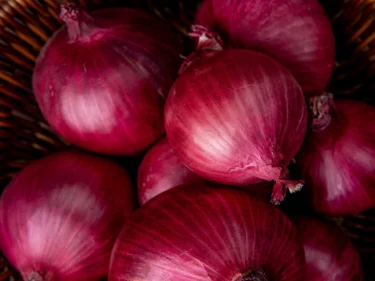
Onion juice has hair growth-promoting activity. It can be applied on the affected area. Onion contains minerals like iron and zinc, which promote hair growth7.
Also Read: Best Home Remedies for Oily Scalp and Hair

Capsicum is widely used for its nutritional value. The chemical constituents present in capsicum play an important role in hair growth7.
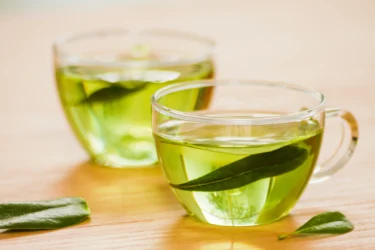
The polyphenols present in green tea showed effects on hair loss in an animal study. The anti-inflammatory (inflammation-reducing) and anti-stress (stress-reducing) benefits of polyphenolic compounds present in green tea might be responsible for the hair growth-promoting activity7.

Lavender oil can be applied topically to promote hair growth. Before using, lavender oil can be mixed with carrier oils, for example, jojoba oil8.

Folic acid is used by our body to make new cells. Hair follicles make new cells every day. Foods rich in folic acid can be added to the diet to meet the daily dietary requirement of folic acid9.

Supplementing the diet with omega 3 fatty acids and omega 6 fatty acids along with antioxidants results in thicker hair and promotes hair growth4. Good sources of omega-6 fatty acids are sunflower oil, corn oil, walnuts, and pumpkin seeds. Foods rich in omega-3 fatty acids include walnuts, chia seeds, flaxseeds, and fish like sardines, salmons, and mackerel10.
Also Read: Effective Home Remedies for Silky Hair
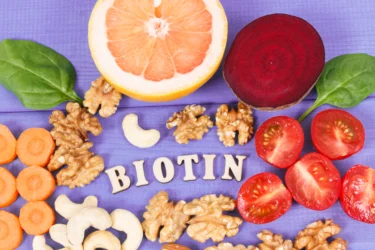
Biotin is another health supplement that promotes hair growth and thickens hair, but there is not enough data to prove its effectiveness in humans4.
Though there are studies that show the benefits of the given herbs and home remedies in this condition, these are insufficient and there is a need for further studies to establish the true extent of the benefits of these herbs and home remedies on human health. Thus, these should be only taken under the guidance and supervision of your Ayurvedic physician. If you’re facing any side effects from given medications or treatments, do let your doctor know.
Sesame oil contains Palmitic acid, oleic acid, linoleic acid, linolenic acid. As the oil has enhanced penetration and reaches up to the hair follicle, it increases the circulation of the scalp, thereby increasing hair growth and strength. For best effects use twice a week.
Dr. M.G. Kartheeka, MBBS MD(Pediatrics)
You should seek medical help if:
You must not rely on home remedies for the treatment of this condition. Similarly, do not self-medicate, and you should consult a qualified doctor for any advice for the condition.
Also Read: Natural Home Remedies For Grey Hair
Hair thinning is a sign of hair loss. Hair loss is common in both men and women, and it can have many underlying causes3. There are many herbs and home remedies like amla, shikakai, bramhi, and fenugreek, that help in taking care of hair and promote hair growth6–8. But in case of hair loss that is sudden and unexplained, consult a doctor for advice2. Knowing the cause of hair loss is vital for its treatment.
Also Read: Effective Home Remedies For Frizzy Hair
Some commonly found herbs that can promote hair growth and hair health are amla, shikakai, bramhi, jatamansi, onion, capsicum, green tea, fenugreek, rosemary, ginseng, and china rose7.
Scalp massage is known to increase hair thickness and promote hair growth. Messaging the scalp stimulates blood flow to the scalp and follicles5. The hair thinning might be a sign of hair loss3. Ingredients like amla, shikakai, and bramhi, can be used to promote hair growth6,7. You can try meeting a dermatologist (doctor for hair, nails and skin problems) to know the underlying cause of the condition and get suitable care4.
Folic acid is a nutritional supplement that helps the body to make newer cells. It can help hair follicles in making newer cells and promote hair growth9. You can add foods rich in folic acid, like bread, and breakfast cereals (fortified with folic acid), to your diet to meet your daily requirement9. Fatty acids (omega 3 and omega 6) are also helpful supplements to get thicker hair4.
You can meet a dermatologist for your hair loss. You can also reach out to a general practitioner to get a diagnosis1.
Green tea contains polyphenolic compounds. These polyphenols are known to have anti-inflammatory (inflammation-reducing) and anti-stress (stress-reducing) benefits, which are helpful in promoting hair growth7.
Disclaimer: The information provided here is for educational/awareness purposes only and is not intended to be a substitute for medical treatment by a healthcare professional and should not be relied upon to diagnose or treat any medical condition. The reader should consult a registered medical practitioner to determine the appropriateness of the information and before consuming any medication. PharmEasy does not provide any guarantee or warranty (express or implied) regarding the accuracy, adequacy, completeness, legality, reliability or usefulness of the information; and disclaims any liability arising thereof.
Links and product recommendations in the information provided here are advertisements of third-party products available on the website. PharmEasy does not make any representation on the accuracy or suitability of such products/services. Advertisements do not influence the editorial decisions or content. The information in this blog is subject to change without notice. The authors and administrators reserve the right to modify, add, or remove content without notification. It is your responsibility to review this disclaimer regularly for any changes.
Next Page »« Previous Page